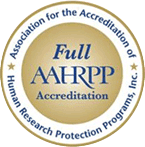
-
Immediately notify the following individuals of the upcoming inspection:
- Study team members – PI, sub-investigators, study coordinators, data managers, Department Chair or head, and directors of clinics or centers
- Study Sponsor or Contact Research Organization (CRO). If your sponsor is an Industry Sponsor, they may send representatives to assist you in preparing for the inspection. Notify the FDA inspector if the sponsor representative requests to be present during the inspection. If the FDA inspector approves the request, explain that the sponsor may observe and take notes but s/he is not to communicate with the inspector unless asked specific question(s).
- Institutional Review Board (IRB) - E-mail the Human Subjects Office at irbmonitors@uiowa.edu.
- Attach to that e-mail a copy of your completed Initial Intake Form (see Appendix 1 on pages 11-12)
- The HSO will contact the Office of the General Counsel on the Principal Investigator’s behalf (if, for example, the inspection is for cause, or if it is a follow-up inspection and you worked with the Office during the initial inspection)
- ***IRB Compliance Staff are required to attend the Opening and Exit Interviews.***
- UI Privacy Officer - E-mail deborah-thoman@uiowa.edu or call the UIHC Compliance Office at 384-5897.
- Pharmacy - Mike Brownlee - Email michael-brownlee@uiowa.edu or call Pharmacy Administration at 356-2577.
- Medical Records - Contact your Human Resources (HR) representative (or your ‘trusted requestor’ for research). S/he will contact Health Care Information Systems (HCIS) - Identity Management to arrange access to the electronic medical record (EMR).
In addition, as appropriate, notify other groups or entities who may be involved, including but not limited to:
- Investigational Drug Service (IDS).
- Ancillary departments – labs, radiology (if the inspector requests to tour these areas).
-
The PI should review his/her investigator responsibilities, including:
- The FDA Form 1572 or ‘Statement of Investigator’ that s/he signed at the beginning of the study.
- Study team contact list for the purpose of:
- Reviewing roles and responsibilities.
- Ensuring appropriate delegation of study related tasks.
- List of current active protocols.
-
Time-permitting, the PI and members of the study team should review the following:
- Current IRB-approved version of the protocol.
- Current IRB-approved Informed Consent Document(s).
- Current Investigator Brochure.
- Sponsored Agreement
- Correspondence and documentation with sponsor/IRB.
- Tracking methods for optional agreements (if applicable).
- Test article accountability records, including:
- Shipping receipts and accountability logs.
- Return to sponsor.
- Study Logs.
- Screening/enrollment, inclusion/exclusion, specimen tracking
- Monitoring activities
- Study reports – timeliness of Adverse Event (AE) reporting, sequence of reports, additional treatments.
-
Review each individual subject’s study records, eligibility criteria, and signed Informed Consent Documents (ICDs).
If the signed ICDs are kept in individual subject binders, remove them and compile them into a single binder for all enrolled subjects.
-
Identify and locate the following records that the FDA is most likely to inspect, including:
- Regulatory documents
- Delegation of Authority logs
- All IRB-approved versions of the protocol and Investigator Brochures
- All IRB-approved versions of Informed Consent Documents
- All IRB correspondence (e.g., approvals, continuing reviews, current consent documents, enrollment/screening logs, etc.)
- Regulatory agency correspondence – both to/from agencies
- Annual report(s)
- FDA Forms 1572 and FDA 1571
- Subject Related Documents
- Case Report Forms (print copies of any electronic case report forms)
- All supporting source documents
- Clinical or hospital records (related to the subject’s diagnosis/condition, records to support subject eligibility, etc.)
- Laboratory, radiology reports, EKGs, etc.
- Device/Drug Accountability Records
- Adverse Event Logs and Serious Adverse Event Reports
- Subject diaries
- Documentation of protocol deviations (missed procedures, missed visits, etc.)
- The inspector often reviews the first and last subjects’ records and then randomly selects other records to review.
-
Review all of the identified records to:
- Identify any weaknesses or gaps (i.e., source documents not included in the research record, incomplete or out of date delegation log, etc.).
- Pay close attention to protocol variances, as these could be explained through the use of a Note to File (NTF)
- Assure that the PI has signed all NTF’s, and retrospectively add them (with current date) if they are missing.
- Correct items that can be corrected using appropriate correction methods.
- Line through date to be corrected/changed, initial and date (with the current date) any changes or corrections.
- Retain originals and never use white-out.
- Identify any items noted during prior inspections or monitoring visits and ensure that those items have been appropriately addressed.
- Develop and implement a written corrective and preventive action (CAPA) plan with appropriate approvals (IRB, FDA, or sponsor) to address identified problems.
-
Designate a person to oversee the inspection.
- This person, usually the research coordinator, should be knowledgeable about the study activities and records.
- This individual should also be able to coordinate with the study PI and other study personnel both prior to and during the course of the inspection.


